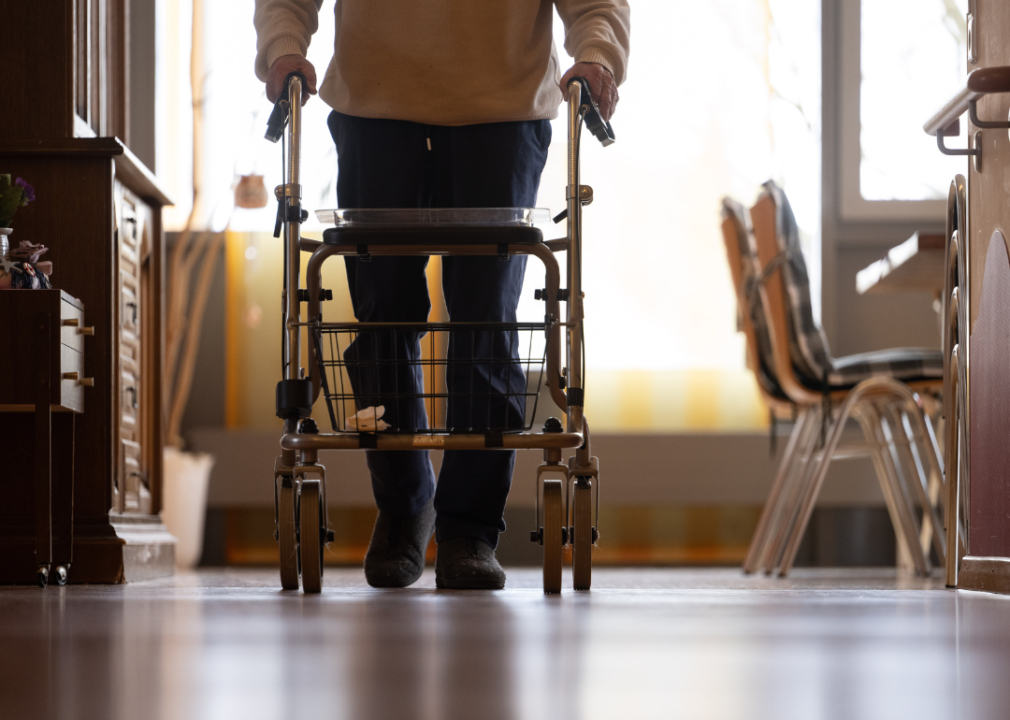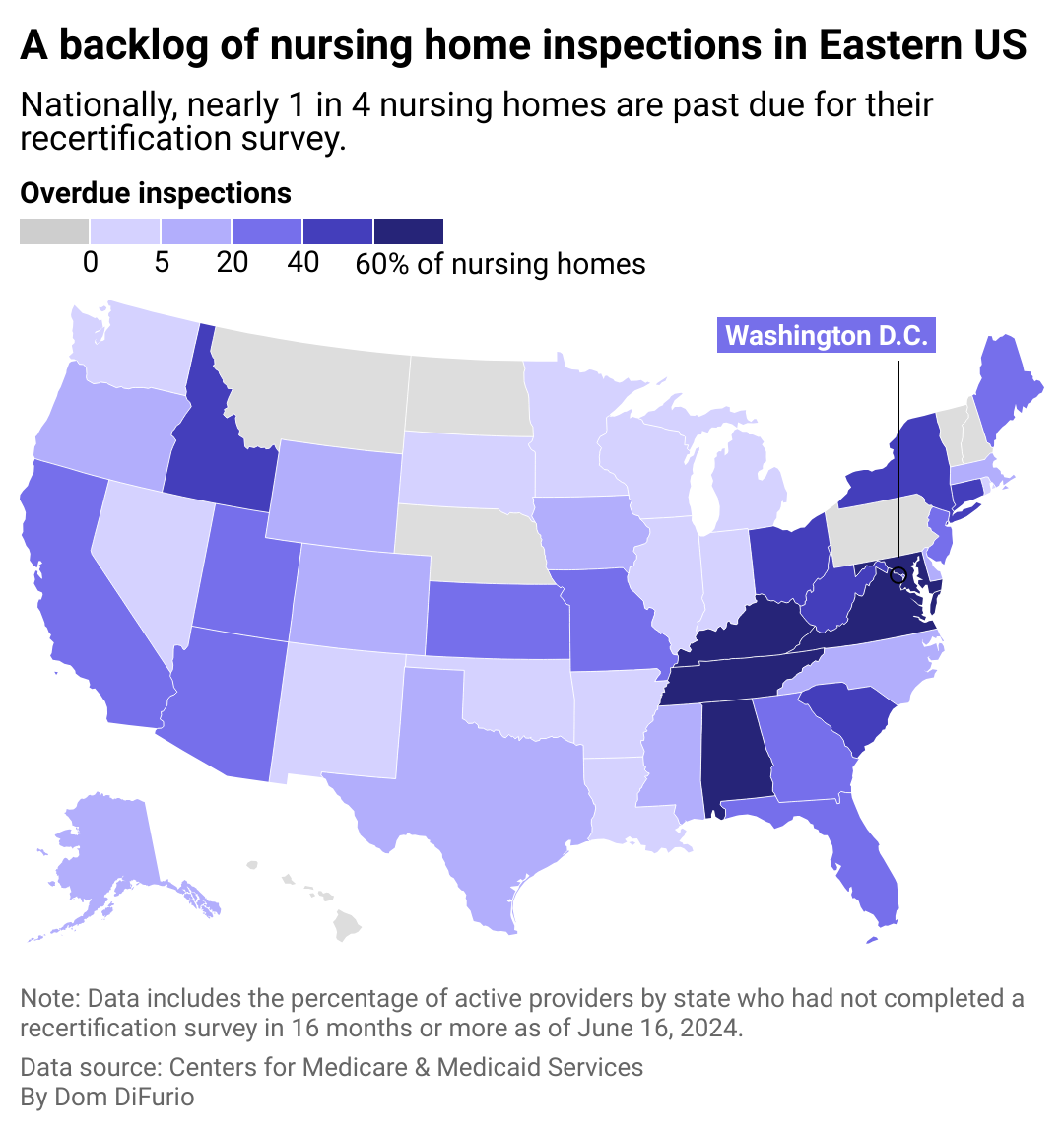Data shows nursing home inspection backlog is improving very slowly. Here's how it looks in your state.

Marijan Murat/picture alliance // Getty Images
Data shows nursing home inspection backlog is improving very slowly. Here’s how it looks in your state.
An elderly man using a walker in a nursing home.
More than one year since the COVID-19 public health emergency ended, state and federal agencies are still struggling to respond to a rising volume of nursing home complaints nationwide.
Nursing Homes analyzed nursing home inspection data from the Centers for Medicare & Medicaid Services, or CMS, to illustrate the extensive backlog in nursing home inspections since the pandemic began in 2020.
Nursing homes provide care for more than 1.2 million aging Americans today, according to the Department of Health and Human Services. During the height of the pandemic, these facilities became ground zero in the country’s efforts to curb the gruesome impact of coronavirus, which American Health Care Association President and CEO Mark Parkinson called “a perfect killing machine” for elderly patients.
Now, those facilities are facing a slew of lawsuits alleging wrongful death amid a lack of oversight as regulators struggle to inspect a heap of complaints directed at facilities nationwide, a 2023 investigation published by Newsweek found. In a follow-up, a Senate committee later found in a report published that May that inadequate federal investment in inspections had “put older adults and people with disabilities at risk.”
Nursing home inspections allow the federal agency to be sure facilities receiving Medicare funds comply with rules and regulations that uphold residents’ civil and legal rights. These inspections help ensure communication with doctors and families in the event of an injury, that nursing homes take responsibility for handling residents’ financial and personal belongings, and that they provide a certain standard of care that includes controlling and preventing infection.
The CMS contracts with state health departments to conduct surveys of nursing homes across the U.S. However, the COVID-19 pandemic caused the CMS to limit survey activity periodically throughout the public health emergency declaration from March 2020 to May 2023, according to the agency. Through that period, it directed states to focus surveys of nursing homes on assessing compliance with infection prevention and control standards to mitigate the spread of COVID-19.
Nationwide, nearly 1 in 4 nursing homes (or 3,573) are overdue for a recertification inspection, meaning they haven’t received an inspection in over 15 months. And more than 1 in 10 nursing homes (or 1,754) haven’t received that inspection in two years or more.
In a statement provided to Stacker, CMS spokesperson April Washington said the agency is “committed to holding facilities accountable for meeting these standards.” However, as surveys have resumed, the agency acknowledged that states have struggled to clear a backlog of inspections necessary to ensure facilities are in compliance with CMS regulations, citing limited resources.
Those backlogs look different from state to state as the CMS and a congressional investigation point to lacking budgets as a major factor behind some states’ inability to catch up. In many places, an inability to hire and retain inspectors is hampering efforts to ramp up oversight again.
![]()

Dom DiFurio // Nursing Homes
Improvements to inspection backlog stalling
A column chart showing the percentage of active nursing homes that have been inspected from 2017-2023. Before 2020, almost 9 in 10 were inspected annually. In 2020 it was 1 in 4. Inspections doubled year over year in 2020 but have made slow progress in the years since, stalling out around 60%.
Before the pandemic, 9 in 10 active homes were surveyed annually. The number of recertification inspections in 2020 fell to just 27%. Even as the pandemic receded, the backlog remained more or less unchanged throughout 2023, federal data shows. For 2023, only about 2 in 3 (66%) active providers were surveyed, a four-percentage-point increase from 2022.
It’s important to note that the agency’s rules don’t require all nursing homes to receive a recertification survey by inspectors every year, as the data is presented, but rather every 15 months.
The plateau in nursing home recertification inspections comes as the need for nursing home services increases. Nursing homes struggle to maintain high levels of care with a worsening labor shortage.
More American families than ever are projected to need long-term care for loved ones as an aging baby boomer population enters its retirement years, dubbed the “Silver Tsunami.” One estimate projects 3,000 more nursing home facilities will be needed by 2030 to meet the health care needs of a generation that will be entirely 65 or older by then.

Dom DiFurio // Nursing Homes
Nursing home inspection crunch varies across states
A map of the US with states showing as darker colors if the percentage of nursing homes in the state that haven’t been inspected in more than 15 months as required by federal law is higher. States along the eastern US including Kentucky, Maryland, Virginia, Connecticut and New York feature some of the highest rates of overdue inspections.
Kentucky, Maryland, Alabama, Tennessee, and Virginia face some of the most dramatic inspection delays. The CMS told Stacker it will “continue to work with these states individually to address performance concerns related to timeliness of surveys.”
Funding for nursing home oversight, including recertification surveys, hasn’t changed in nine years, according to the CMS. The Biden administration’s proposed fiscal year 2025 budget calls for an increase.
In addition to recertification surveys, the CMS funds and oversees the inspection of nursing home complaints submitted by patients and their families. The budget proposal would also help state and federal agencies follow up on a sharp increase in nursing home complaints in recent years, according to the CMS. The agency anticipates states will need to perform more than 90,000 nursing home complaint surveys in 2025, representing a 13% increase from 2022.
“This investment will strengthen health, quality, and safety oversight for … participating Medicare or Medicaid provider facilities,” Washington said.
DGLimages/Shutterstock
How to get help with nursing home problems
Woman nurse serving elderly woman patient a plate of food at a dinner table.
As Newsweek previously reported, some families have taken to resolving problems with individual nursing homes into their own hands by filing civil lawsuits alleging neglect of a loved one. Organizations like the Nursing Home Abuse Center provide legal resources to hold facilities accountable for suspected negligence.
The CMS recommends talking to nursing home staff—be it a supervisor, social worker, nursing director, or doctor. Medicare- and Medicaid-certified nursing homes are also required to post the name, address, and contact information of the state survey agency overseeing the nursing home, as well as other state oversight and advocacy services and the Medicaid fraud control unit. The proper state nursing home survey agency and their contact information can also be found here.
Story editing by Alizah Salario. Additional editing by Kelly Glass. Copy editing by Paris Close. Photo selection by Lacy Kerrick.
This story originally appeared on Nursing Homes and was produced and distributed in partnership with Stacker Studio.
